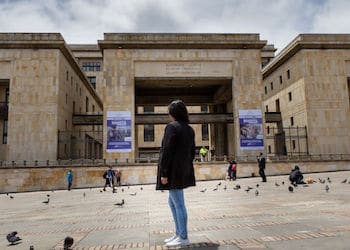A recent court decision recognizing acts of sexual violence that took place within the FARC during the armed conflict in Colombia has set a welcome precedent regarding the roles of former female combatants within the armed group.
On December 11, Colombia’s Constitutional Court issued a sentence that recognizes Helena, a woman forcibly recruited by the Revolutionary Armed Forces of Colombia (Fuerzas Armadas Revolucionarias de Colombia – FARC) at the age of 14 and later forced to have an abortion, as a victim of the armed conflict. Helena’s name was changed to protect her identity.
According to Women’s Link Worldwide, an organization that defends the rights of women and children and was responsible for bringing the case to court, Helena was forced to take anti-contraceptive injections over the greater part of her time with the guerrilla group. But she still got pregnant as the result of a consensual relationship.
SEE ALSO: Colombia News and Profile
According to her testimony, when she pleaded with commanders to be allowed to have her child, they threatened to execute her by firing squad. Helena underwent the abortion against her will and in poor sanitary conditions. Her testimony has revealed how she continues to suffer from the serious physical and psychological consequences of the procedure to date.
The Court ordered Helena to receive specialized medical assistance in addition to being included on Colombia’s National Victims Registry, guaranteeing her access to reparations provided for by the 2011 Victims Law.
Helena’s case is one of 35 victim testimonies recounting instances of reproductive violence that are currently being reviewed by the JEP.
The FARC saw pregnancies as being incompatible with the guerrilla lifestyle and birth control measures were mandatory for female members after the Eighth Guerrillero Conference held in 1993.
InSight Crime Analysis
The court’s ruling has brought the violations of women’s sexual and reproductive rights committed by the FARC to the center of Colombia’s post-conflict debate. Additionally, it sets an international benchmark for the recognition of such violence suffered by women and girls within armed groups.
Instances of sexual and reproductive violence within the FARC have been underreported, some estimates hint to the magnitude of the problem. According to internal FARC documents seen by the newspaper El Espectador in 2013, about 1,000 abortions were conducted within the guerrilla each year.
Since the peace agreement of 2016, reports of sexual and reproductive violence within the FARC’s ranks have increased. Women’s Link Worldwide has defended several of these cases before the Special Jurisdiction for Peace (Jurisdicción Especial para la Paz – JEP), the entity created by the Colombian government and the FARC to administer transitional justice and to recognize the crimes committed within the framework of the armed conflict.
According to the plaintiffs, the court ruling in Helena’s case represents a victory for the restitution of rights for many female former combatants who were forcibly recruited and violated of their reproductive rights.
SEE ALSO: Women Taking On More Roles Within Colombia’s Drug Trade
Before this court decision, the cases of these women were in judicial limbo, as they “were excluded from receiving reparations under the Victims’ Law for having demobilized or fled the FARC at a legal age, and had no other way of receiving reparations,” stated Mariana Ardila, a lawyer from Women’s Link.
This case clarifies that having been part of a guerrilla group or having participated in criminal acts does not deprive these women of seeking and receiving reparations for acts of physical, sexual and emotional violence against them.

